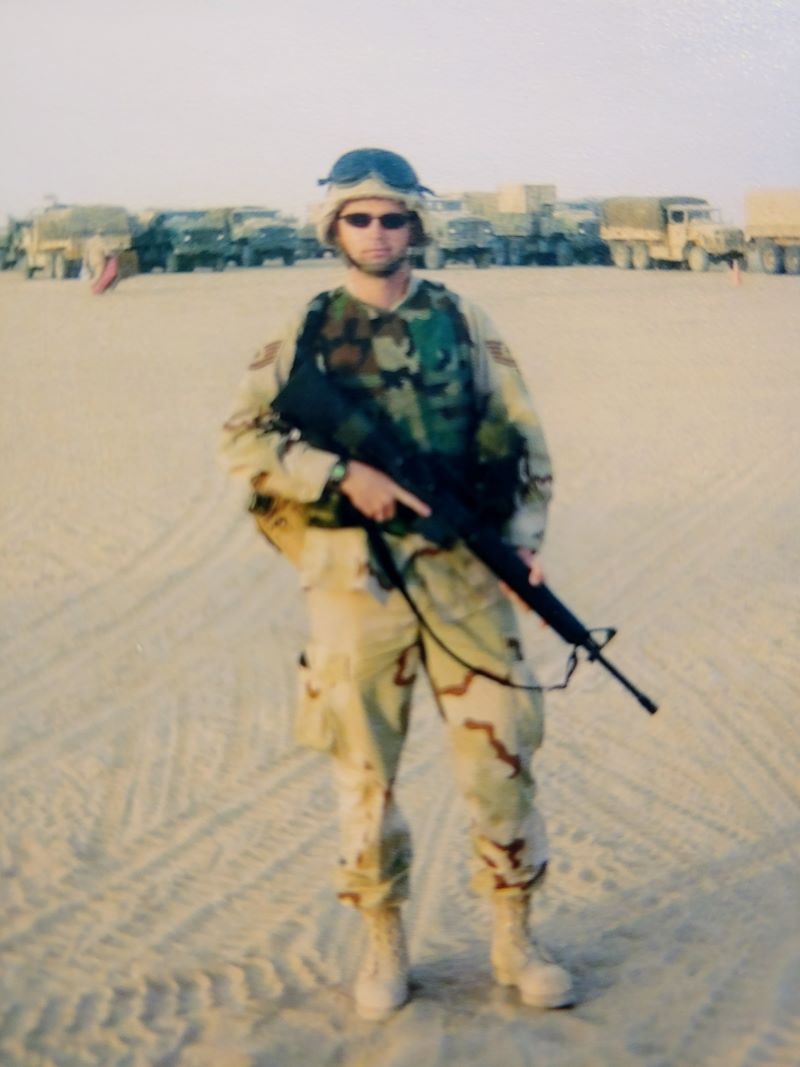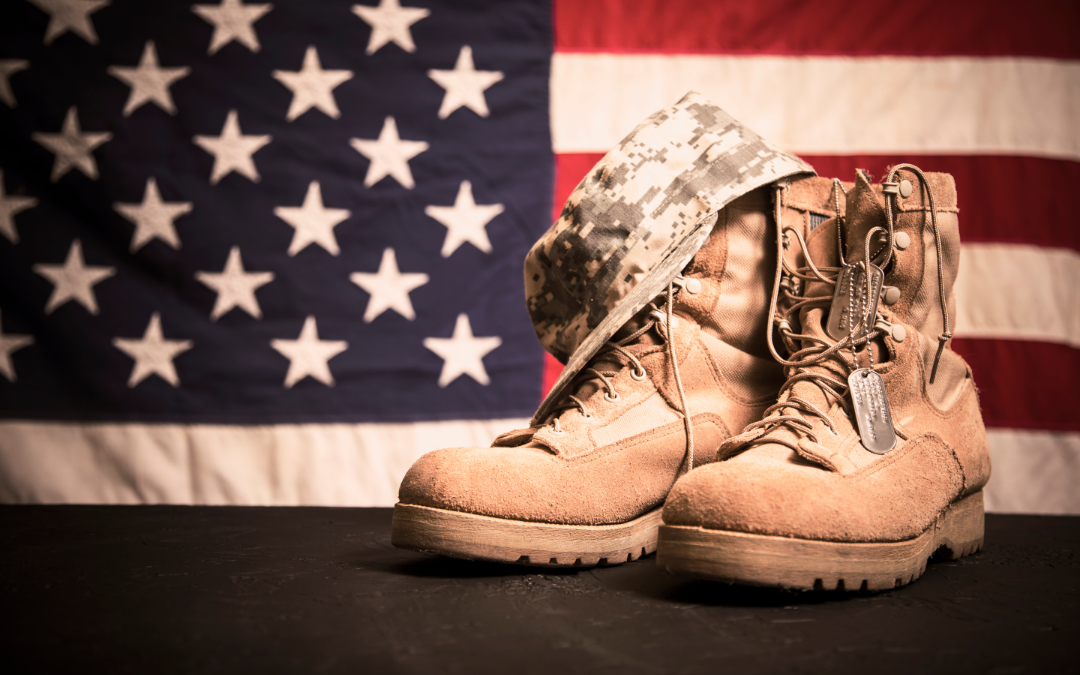Author: Vivian Cumins
“Hey Babe, I’m okay – just don’t watch the news. I will call you when I can. I love you.”
That was all my husband, Eddy, said before the old military field phone went dead. I didn’t hear his voice again for over a week. Eight days, to be exact. Eight excruciatingly uncertain days.
Mortar attacks aimed at Camp Taji, Iraq, a military installation used by Iraqi and coalition forces, were a daily occurrence. In fact, they happened so often, the media rarely covered the incidents in detail. On this particular day, however, CNN was on the scene. This time, the devastation and destruction was massive; there were both American and Iraqi casualties. This was news.
As I cradled the phone receiver in my hand, my thoughts immediately flashed back to February 18, 2003 – the last time I saw my husband before boarding an aircraft at the Salt Lake City International Airport. Eddy had been called to serve overseas in support of Operation Iraqi Freedom. This was our first deployment as a married couple.
The sense of national solidarity and support that originated after the September 11, 2001 terrorist attacks was felt the moment we arrived at the airport. The black M-16 carrying case and government-issued green bags Eddy hauled around were telling. Some people offered supporting nods and smiles as we walked by. Others shook Eddy’s hand and thanked him for his service to our country. The airport staff went above-and-beyond for us; they were understanding and kind to our family. They even allowed my daughter and me to go through security and sit with Eddy until his zone was called, a gesture that was forbidden since the attacks.
Silent tears streamed down my cheeks as I sat next to Eddy and tightly held his hand. When the time came for him to go, I gave him a soft kiss and long hug. I didn’t want to let go. For the past two months, we had been so busy going to deployment briefings, getting our legal affairs in order, and meeting with church elders that I failed to prepare myself emotionally for this day. Feelings of immense pride and fear hit me like a ton of bricks as I watched my husband of five months slowly disappear down the jetway.
Eddy arrived at Camp Taji in March following a stint in Kuwait for convoy operations training. He was an Air Force Technical Sergeant at the time, assigned to an Army Fire Department. His assignment was to provide vehicle maintenance, security, and support to the Department as they fulfilled their mission.

Eddy, Camp Taji- 2003
Up until his unsettling call, Eddy and I spoke on the phone once a week. Though our conversations were short, and his words were few, I was thankful to hear his voice. Pockets of silence between our calls were filled with hand-written letters, cards, and care packages my daughter and I put together. We packed small boxes with staples such as Racer X magazines, baby wipes, beef jerky, Chicken and a Biskit crackers, and that squeezy Cheddar cheese that comes in a can. Not everyone deployed to Camp Taji received care packages, Eddy informed me, so I gladly satisfied his request to pack extra goodies so he could share.
I wasted no time searching for information as to the meaning of his call. Against Eddy’s wishes, I flipped through every news channel – nothing. I did Internet searches – nothing. I called Eddy’s Squadron Commander and First Sergeant – nothing. I got the feeling they knew what had happened overseas, however, they were not at liberty to tell me. As a military spouse, I understood Operations Security (OPSEC), nevertheless, I struggled with the fact I was left to wrangle my unsettled thoughts alone. Had my husband been hurt? Was he taken hostage? Had he and his comrades seen combat? My mind raced out of control.
As a woman of faith, I wish I could say that I trusted God that my husband was okay, but the truth is, I was terrified. For eight days, I tortured myself with agonizing thoughts. I couldn’t concentrate. I couldn’t eat. I couldn’t even pray. Then finally, an angel of mercy, disguised as a DSN phone operator, patched a call from Eddy to our home.
The Defense Switched Network, otherwise known as DSN, is a worldwide Department of Defense telephone system. It allows calls to be sent and received from one military installation to another. We lived on base, so the call was easily patched through the landline in our home. With the 10-hour time difference, Eddy took a chance I would be home. Little did he know, I had been waiting by the phone for over a week.
Eight days prior, he told me, he was awakened by the explosion of two car bombs outside Camp Taji’s main gate. The bombs rattled the entire military installation. The highway was blown to smithereens, along with innocent American and Iraqi pedestrians, drivers, and passengers, of which were left to burn inside their vehicles. Eddy assured me he had not been harmed in the attack. He arrived on scene immediately after the explosions and tended to burning vehicles.
With military casualties, he explained, all communication in-and-out of Camp Taji had to be shut down to allow next of-kin notifications. He was concerned I would see the CNN broadcast and think the worst when I didn’t hear from him.
Even though Eddy was in the middle of war-related chaos, he thought of someone other than himself. He thought of me. He wanted to assure me he was okay. He didn’t want me to worry (sorry honey, I did anyway!) He was selfless – a character of a true hero.
Thank you to all who are and have served and thank you to the families who love and support them.
Ways to show appreciation to a Veteran:
-
- Say “Thank you”.
- If you see a military member in uniform while at a restaurant, secretly pick up their tab.
- Donate to a cause that supports veterans.
- Listen to their stories.
- Attend local Veteran’s Day parades.
- Fly an American flag – fly it properly.
- Write. Write a story on a blog, in a public forum, or for a local newspaper.
- Volunteer at a military installation.
- Offer to help the family of a deployed military member.
- Send cards and letters of gratitude to deployed military members.
- Pray for them and their families.
- If you own a business, offer a military discount.
- Open your home to military members and their families for the holidays.
- Get to know the veterans in your neighborhood; be respectful during holidays that include fireworks – a pretty firecracker could be a traumatizing trigger.
- Vote


 Vivian is a storyteller and writer from small-town Oklahoma who loves bringing joy and laughter to others through the gift of memory-sharing.
Vivian is a storyteller and writer from small-town Oklahoma who loves bringing joy and laughter to others through the gift of memory-sharing. 
Excellent!
Thank you, Rebecca!
Awesome!
Thank you!
This is a very poignant post, Viv. Even if I haven’t agreed with every war that we’ve fought, I always honor those who have fought for us and am deeply grateful to them. Thank you for your excellent ideas, and please thank Eddy for his service. I’m glad he came home safely. 🙂
And congratulations to the two of you on your recent move! That is so exciting!
Hi Laurel! I will certainly pass on your gratitude to Eddy for his service. This was an emotional post – even after all these years. I am thankful he was kept safe during all of his deployments – I know so many who have paid the ultimate price and it is heartbreaking. Thank you for taking time to read and post a comment. I have been enjoying catching up on your adventures on your site! Happy Thanksgiving my friend.